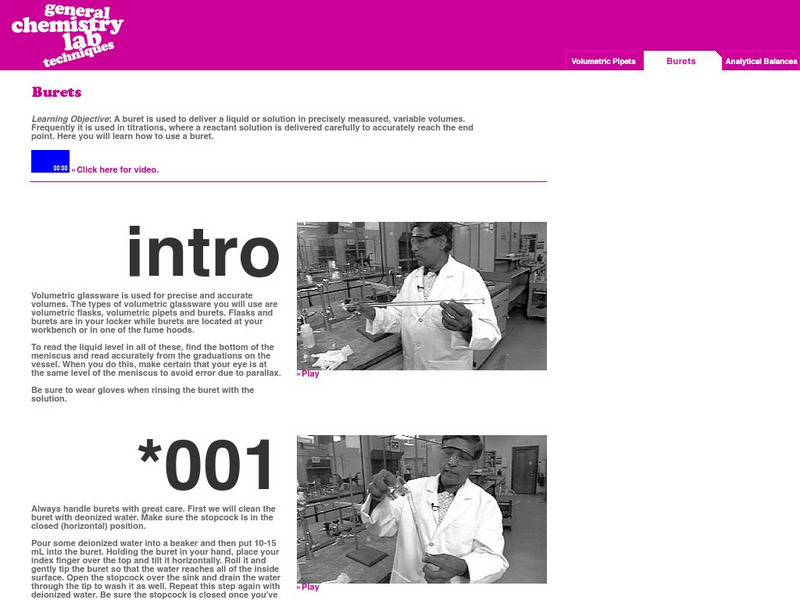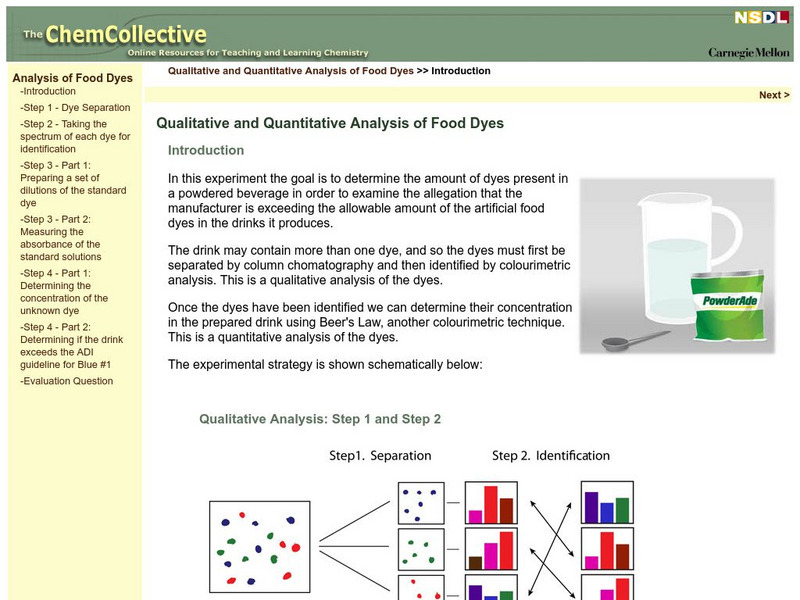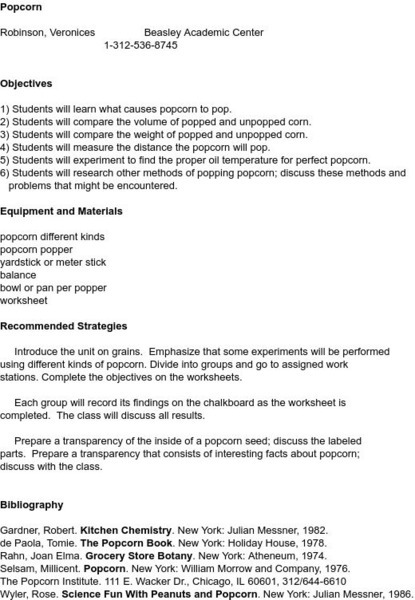Utah STEM Foundation
Utah Stem Action Center: Marie Curie and Chemistry
Lesson teaches about Marie Curie and Chemistry. Lab activities include making slime, elephant toothpaste, and snow, and also a balloon rise.
Other
The Catalyst Chemistry Resources for Teachers
This site directs teachers to relevant information for use in the teaching of chemistry. The site's content includes projects, demos, labs and activities, and more.
Dartmouth College
Dartmouth College: Chem Lab: Coordination Chemistry 3.2
In this experiment, you will study the reaction between your cobalt complex and the nitrite ion. The nitrite ion can exchange with a water ligand and the mechanism of this ligand exchange will be investigated. Requires Java plug-in.
Dartmouth College
Dartmouth College: Chem Lab: Coordination Chemistry 3.1: Acid/base Analysis
In this experiment, you will examine the acidity of your coordination complex's water ligand. You will determine the acid dissociation constant of the complex by titrating it with a base. There are eight weeks of experiments in this series.
Dartmouth College
Dartmouth College: Chem Lab: Coordination Chemistry 1: Synthesis
In this four-week experiment, you will synthesize a compound and purify it in week 1. In week 2, you will assay it for purity by colorimetric analysis and by gravimetric analysis. In week 3, you will analyze your compound by titration of...
Dartmouth College
Dartmouth College: Chem Lab: Titration
A titration is a method of analysis that will allow you to determine the precise endpoint of a reaction and therefore the precise quantity of reactant in the titration flask. This site demonstrates how to correctly perform this analysis.
Science Bob Pflugfelder
Science Bob: Lemon Chemistry: An Acid Base Experiement
Science Bob presents instructions for conducting an acid-base experiment using common supplies with information on how it works.
Dartmouth College
Dartmouth College: Chem Lab: Repipet
Learn what a repipet is and how it is used in this brief but informative site.
Yale University
Yale University: General Chemistry Lab Techniques: Burets
Tutorial shows proper procedure for handling a buret and using this piece of laboratory equipment to measure liquid volume. View accompanying video full-length [18:00] or in segments.
Thomas Jefferson National Accelerator Facility
Jefferson Lab: Atoms, Elements and Molecules: Questions and Answers
Read common questions and answers about atoms, elements and molecules.
Carnegie Mellon University
Chem Collective: Qualitative and Quantitative Analysis of Food Dyes
An interactive tutorial to determine the amount of dyes present in a powdered beverage in order to examine the allegation that the manufacturer is exceeding the allowable amount of the artificial food dyes in the drinks it produces.he...
Chemistry Collective
Chem Collective: Coffee Problem
In this activity, students use knowledge of specific heat capacity to mix together hot coffee and cold milk to create a solution of coffee at a desired temperature. In this randomized problem, each student is given a different final...
Science Education Resource Center at Carleton College
Serc: Bubbling Blobs
In this chemistry lab, students investigate how oil and water don't mix. They will work on their observation skills and their ability to follow directions to ensure they get the correct results. Students can then develop a new, testable...
Dartmouth College
Dartmouth College: Pipet
A concise but informative explanation of what a pipet is and how to use a pipet bulb.
Dartmouth College
Dartmouth College: Centrifugation
"A centrifuge separates a heterogeneous mixture of solid and liquid by spinning it." Use this site to find out how to correctly use a centrifuge in this informative site.
Science and Mathematics Initiative for Learning Enhancement (SMILE)
Smile: Popcorn Is a Gas
From the Science and Mathematics Initiative for Learning Enhancement (SMILE) program. A lesson plan in which learners explore the pressure-temperature-volume relationships by performing a popcorn lab investigation. Intriguing. Great...
Science and Mathematics Initiative for Learning Enhancement (SMILE)
Smile: Relationships: Pressure, Volume, and Temperature
From the Science and Mathematics Initiative for Learning Enhancement (SMILE) program. A lesson plan that centers around a lab investigating the gas laws of Boyle, Charles, and Gay-Lussac. Data is collected, analyzed and discussed.
Alabama Learning Exchange
Alex: Writing Word Equations
The students will learn to write word and formula equations. We will watch a web video about chemical equations. We will then complete the science in motion lab "The Color of Chemistry". The students will also be required to write word...
Other popular searches
- Acid Base Chemistry Labs
- Chemistry Labs of Hydrates
- High School Chemistry Labs
- Christmas Chemistry Labs
- Thermo Chemistry Labs
- Holiday Chemistry Labs
- Introduction Chemistry Labs
- Therm Chemistry Labs
- Online Chemistry Labs
- Chemistry Labs With Candy









